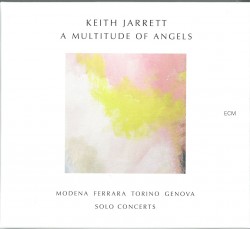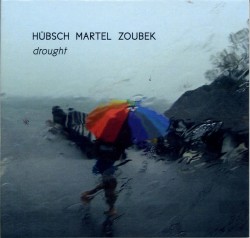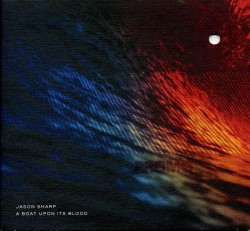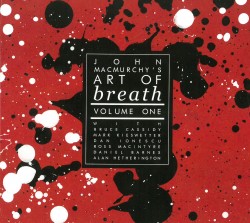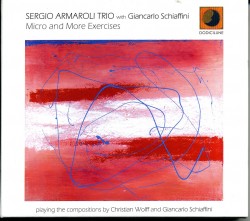A New Way of Hearing Notated Music
Like labels being taken off beverage bottles for blind taste tests, the designations of what characterizes distinct musical genres has become increasingly fluid over the past few years. This is most evident when it comes to Western improvised and notated music. With established so-called classical music ensembles becoming increasingly hidebound and conservative, it’s new music companies that showcase composers’ new works, many of which feature improvisation. In a mirror image of this, jazz musicians create novel programs not only tweaking classical composed material, but also premiering contemporary composers’ scores.
 Arguably the most audacious admixture occurs on Mass (RareNoiseRecords RNR CD 072 rarenoiserecords.com), a reimagining of Missa Sancti Jacobi, a nine-part choral work by Guillaume Dufay (1397-1474). As if he’s draping cathedral walls with an embroidered tapestry whose intricate designs reflect secular as well as sacred concerns, Niagara Falls, NY-born percussionist Bobby Previte aggrandizes the Dufay work by having it performed by a combo of himself, electric bassist Reed Mathis, electric guitarists Don McGreevy, Mike Gamble, Jamie Saft, with Marco Benevento on pipe and electric organs, and most prominently, guitarist Stephen O’Malley of drone rock band Sunn O))). Benevento’s nave-shaking grandiloquence appears equally influenced by resonant organ compositions by Olivier Messiaen and the prog rock blowouts of Rick Wakeman. Ecclesiastical connections are maintained not only by Messiaen-like pipe-organ tropes, but also by Latin vocalizing from the 11-member Rose Ensemble. The sonic brocade is most evident on those tracks where Dufay’s choral sections are harmonized with instrumental breaks that could have migrated from a death metal session. On Gloria for instance, vocal polyharmonies move upwards alongside organ glissandi and fuzzy guitar riffs. Previte’s sinewy percussion and Mathis’ jazz-like bass line create a backdrop on which the beauty of stacked and intertwined male and female voices can be appreciated on Credo. This is followed by a sequence that contrasts triple vocal hocketing and pseudo-psychedelic guitar riffs. In a similar fashion, vocal chanting snakes around augmented and diminished riffs from the rhythm section on Alleluia. Benevento’s beat-club variants give way to accompanying the delicate vocals on Agnus Dei. The guitars absent on that track move to the centre on the concluding Communion. A showpiece for O’Malley, the track highlights as many shaking effects, whistling distortions and dial twisting that could be found in an electric guitar demonstration, yet polyphonically matches this swaggering display with liturgical infusions from the ensemble. Before the piece climaxes with guitar riffs and jackhammer percussion, Benevento’s incessant tremolo, which sounds as if numerous church organs are quivering in unison, is swept away by harmonized vocal and instrumental timbres. A mixture of profound and profane, Mass is awe-inspiring in both its original and contemporary meanings.
Arguably the most audacious admixture occurs on Mass (RareNoiseRecords RNR CD 072 rarenoiserecords.com), a reimagining of Missa Sancti Jacobi, a nine-part choral work by Guillaume Dufay (1397-1474). As if he’s draping cathedral walls with an embroidered tapestry whose intricate designs reflect secular as well as sacred concerns, Niagara Falls, NY-born percussionist Bobby Previte aggrandizes the Dufay work by having it performed by a combo of himself, electric bassist Reed Mathis, electric guitarists Don McGreevy, Mike Gamble, Jamie Saft, with Marco Benevento on pipe and electric organs, and most prominently, guitarist Stephen O’Malley of drone rock band Sunn O))). Benevento’s nave-shaking grandiloquence appears equally influenced by resonant organ compositions by Olivier Messiaen and the prog rock blowouts of Rick Wakeman. Ecclesiastical connections are maintained not only by Messiaen-like pipe-organ tropes, but also by Latin vocalizing from the 11-member Rose Ensemble. The sonic brocade is most evident on those tracks where Dufay’s choral sections are harmonized with instrumental breaks that could have migrated from a death metal session. On Gloria for instance, vocal polyharmonies move upwards alongside organ glissandi and fuzzy guitar riffs. Previte’s sinewy percussion and Mathis’ jazz-like bass line create a backdrop on which the beauty of stacked and intertwined male and female voices can be appreciated on Credo. This is followed by a sequence that contrasts triple vocal hocketing and pseudo-psychedelic guitar riffs. In a similar fashion, vocal chanting snakes around augmented and diminished riffs from the rhythm section on Alleluia. Benevento’s beat-club variants give way to accompanying the delicate vocals on Agnus Dei. The guitars absent on that track move to the centre on the concluding Communion. A showpiece for O’Malley, the track highlights as many shaking effects, whistling distortions and dial twisting that could be found in an electric guitar demonstration, yet polyphonically matches this swaggering display with liturgical infusions from the ensemble. Before the piece climaxes with guitar riffs and jackhammer percussion, Benevento’s incessant tremolo, which sounds as if numerous church organs are quivering in unison, is swept away by harmonized vocal and instrumental timbres. A mixture of profound and profane, Mass is awe-inspiring in both its original and contemporary meanings.
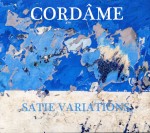 Compositionally moving forward a few centuries is Montreal’s six-piece Cordâme, whose interpretation of 17 Variations (Malasartes MAM 022 malasartes.org) by French composer Erik Satie (1866-1925) adds free-floating swing to these animated miniatures. Composer/arranger Jean Félix Mailloux does so with agile shadings for his own double bass, Mark Nelson’s percussion and Guillaume Martineau’s piano, with themes largely interpreted by Sheila Hannigan’s cello, Éveline Grégoire-Rousseau’s harp and Marie Neige Lavigne’s violin. Like experimental chemists testing new substances Mailloux encourages the musicians to intermix their experiences. On a track such as Danses de travers for instance, Martineau moves from prosaic note reading to healthy swing, backed by drum pops; while four sets of healthy string slaps make Un morceau en forme de Poire peppier than what Satie envisioned. Avant-dernières Pensées: III Méditation et Variations picks up on the lighthearted run-through of II Aubade that precedes it, but the churn comes from Neige Lavigne’s fiddle and slippery piano comping. Novel tinctures beyond Satie’s ken are suggested as well. Shades of jazz piano phrasing and almost rock-styled drumming are audible on Autour de Gnossienne III; while like the additional detailing added to the frame of an Impressionistic canvas, the centre section of Hannigan outlining the theme in careful fashion is preceded by call-and-response from the other string players and followed by rooted harmonies from piano, bass and drums. The sextet brings out the unblemished beauty plus looming unease that characterizes Les cloches du Grand Maître with the skill of conservatory graduates, but pizzicato motion enlivens the pieces so that it climaxes with percussive plucks and thumps. More characteristically Cordâme confirms its position as a group of more than mere interpreters on Airs à faire fuir. As if the players are superimposing a transparent diagram of new nations on top of the composer’s Edwardian-era map, Grégoire-Rousseau’s bell-like reverb and tick-tock drum beats provide a groove upon which Neige Lavigne sluices out passages that would be equally acceptable in a Balkan ditty or a Satie composition.
Compositionally moving forward a few centuries is Montreal’s six-piece Cordâme, whose interpretation of 17 Variations (Malasartes MAM 022 malasartes.org) by French composer Erik Satie (1866-1925) adds free-floating swing to these animated miniatures. Composer/arranger Jean Félix Mailloux does so with agile shadings for his own double bass, Mark Nelson’s percussion and Guillaume Martineau’s piano, with themes largely interpreted by Sheila Hannigan’s cello, Éveline Grégoire-Rousseau’s harp and Marie Neige Lavigne’s violin. Like experimental chemists testing new substances Mailloux encourages the musicians to intermix their experiences. On a track such as Danses de travers for instance, Martineau moves from prosaic note reading to healthy swing, backed by drum pops; while four sets of healthy string slaps make Un morceau en forme de Poire peppier than what Satie envisioned. Avant-dernières Pensées: III Méditation et Variations picks up on the lighthearted run-through of II Aubade that precedes it, but the churn comes from Neige Lavigne’s fiddle and slippery piano comping. Novel tinctures beyond Satie’s ken are suggested as well. Shades of jazz piano phrasing and almost rock-styled drumming are audible on Autour de Gnossienne III; while like the additional detailing added to the frame of an Impressionistic canvas, the centre section of Hannigan outlining the theme in careful fashion is preceded by call-and-response from the other string players and followed by rooted harmonies from piano, bass and drums. The sextet brings out the unblemished beauty plus looming unease that characterizes Les cloches du Grand Maître with the skill of conservatory graduates, but pizzicato motion enlivens the pieces so that it climaxes with percussive plucks and thumps. More characteristically Cordâme confirms its position as a group of more than mere interpreters on Airs à faire fuir. As if the players are superimposing a transparent diagram of new nations on top of the composer’s Edwardian-era map, Grégoire-Rousseau’s bell-like reverb and tick-tock drum beats provide a groove upon which Neige Lavigne sluices out passages that would be equally acceptable in a Balkan ditty or a Satie composition.
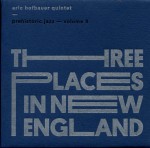 A near contemporary of Satie, the work of Charles Ives (1874-1954) was as unconditionally Yankee as the other’s was Parisian. Guitarist Eric Hofbauer and his Quintet on Prehistoric Jazz Vol. 3 (Creative Nation Music CNM 028 erichofbauer.com) move one of the composer’s iconic works, Three Places in New England, into the improvisational idiom. Like actors performing Shakespeare in modern dress, what Hofbauer and his associates – trumpeter Jerry Sabatini, clarinetist Todd Brunel, cellist Junko Fujiwara and percussionist Curt Newton – do revamps the material. The strategy evolves contrapuntally throughout, with the jazz forays flowing more freely than the somewhat rigid composed material. This works most obviously on Putnam’s Camp, Redding Connecticut, where the march-like gait played by bass clarinet and trumpet is reminiscent of 19th-century brass bands. As Sabatini remains Maynard Ferguson-like orotund in his obbligato, Brunel and Hofbauer float other airs like secular musicians on a nearby bandshell. Crunching guitar thumps and a walking bass line (from Fujiwara’s cello) combine for the final section, which not only swings but refers back to Ives’ original. Similar alchemy is exhibited on the brief The Houseatonic at Stockbridge. While the guitar parts are concentrated and undoubtedly 21st century in execution, the leisurely themes from cello and clarinet affirm the antebellum songs that vibrate alongside the modernist interpretations from the CD’s beginning. Imagine a gentle stream flowing past a plantation porch in 1857. But the plucking on that veranda is from a modern jazz guitarist.
A near contemporary of Satie, the work of Charles Ives (1874-1954) was as unconditionally Yankee as the other’s was Parisian. Guitarist Eric Hofbauer and his Quintet on Prehistoric Jazz Vol. 3 (Creative Nation Music CNM 028 erichofbauer.com) move one of the composer’s iconic works, Three Places in New England, into the improvisational idiom. Like actors performing Shakespeare in modern dress, what Hofbauer and his associates – trumpeter Jerry Sabatini, clarinetist Todd Brunel, cellist Junko Fujiwara and percussionist Curt Newton – do revamps the material. The strategy evolves contrapuntally throughout, with the jazz forays flowing more freely than the somewhat rigid composed material. This works most obviously on Putnam’s Camp, Redding Connecticut, where the march-like gait played by bass clarinet and trumpet is reminiscent of 19th-century brass bands. As Sabatini remains Maynard Ferguson-like orotund in his obbligato, Brunel and Hofbauer float other airs like secular musicians on a nearby bandshell. Crunching guitar thumps and a walking bass line (from Fujiwara’s cello) combine for the final section, which not only swings but refers back to Ives’ original. Similar alchemy is exhibited on the brief The Houseatonic at Stockbridge. While the guitar parts are concentrated and undoubtedly 21st century in execution, the leisurely themes from cello and clarinet affirm the antebellum songs that vibrate alongside the modernist interpretations from the CD’s beginning. Imagine a gentle stream flowing past a plantation porch in 1857. But the plucking on that veranda is from a modern jazz guitarist.
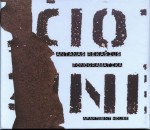 Modernism is taken for granted on Fonogramatika (Lithuanian Classics CD 089) as the five members of the German-British Apartment House ensemble interpret seven compositions by Lithuanian composer Antanas Rekašius (1928-2003). The players are conversant with both notated and improvised music, with reedist Frank Gratkowski, a recognized jazzer as well. Like an illusionist intent on showing his range, Gratkowski brings a sophisticated improvised temperament to the tracks on which he’s featured along with cellist Anton Lukoszevieze and percussionist Simon Limbrick. Gratkowski invests the five-part Phonogram with unexpected snorts, split tones and swizzles, applying Rudy Wiedoeft-like showiness to insets ranging from menacing chalumeau to visceral coloratura tones. Two sections may be labelled Grotesque but have confident rapport with the main theme. Topping low-frequency string swerves and hard drumming as if additional seasoning is being added to a recipe, Gratkowski’s dribbling alto saxophone and robust flute quavers make the three-part Musica dolente e con brio the more overtly jazzy. Atonal bass clarinet snarls contrast enough with stolid drum beats on the five-part Epitaph to encourage ratcheting pizzicato cracks from Lukoszevieze. The cellist’s spiccato multiphonics bring needed airiness and a telephone-wire-like buzzing to Fluorescences the CD’s longest track. Otherwise consecrated to Kerry Yong’s synthesizer, pushed to its limits with hocketing replicating pipe-organ fluctuations, Lukoszevieze’s later string slaps prevent the keyboardist from lapsing into silent-movie-house excess. Regrettably reminiscent of faux ragtime, though composed in 1970, Philip Thomas’ out-of-order reading of Rekašius’ seven Atonic fragments for solo piano are at best performed with staccato high frequency, but at worse resemble early 20th-century composers’ parlour music-like appropriation of American syncopation.
Modernism is taken for granted on Fonogramatika (Lithuanian Classics CD 089) as the five members of the German-British Apartment House ensemble interpret seven compositions by Lithuanian composer Antanas Rekašius (1928-2003). The players are conversant with both notated and improvised music, with reedist Frank Gratkowski, a recognized jazzer as well. Like an illusionist intent on showing his range, Gratkowski brings a sophisticated improvised temperament to the tracks on which he’s featured along with cellist Anton Lukoszevieze and percussionist Simon Limbrick. Gratkowski invests the five-part Phonogram with unexpected snorts, split tones and swizzles, applying Rudy Wiedoeft-like showiness to insets ranging from menacing chalumeau to visceral coloratura tones. Two sections may be labelled Grotesque but have confident rapport with the main theme. Topping low-frequency string swerves and hard drumming as if additional seasoning is being added to a recipe, Gratkowski’s dribbling alto saxophone and robust flute quavers make the three-part Musica dolente e con brio the more overtly jazzy. Atonal bass clarinet snarls contrast enough with stolid drum beats on the five-part Epitaph to encourage ratcheting pizzicato cracks from Lukoszevieze. The cellist’s spiccato multiphonics bring needed airiness and a telephone-wire-like buzzing to Fluorescences the CD’s longest track. Otherwise consecrated to Kerry Yong’s synthesizer, pushed to its limits with hocketing replicating pipe-organ fluctuations, Lukoszevieze’s later string slaps prevent the keyboardist from lapsing into silent-movie-house excess. Regrettably reminiscent of faux ragtime, though composed in 1970, Philip Thomas’ out-of-order reading of Rekašius’ seven Atonic fragments for solo piano are at best performed with staccato high frequency, but at worse resemble early 20th-century composers’ parlour music-like appropriation of American syncopation.
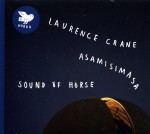 The performance most contiguous to improvised music on Sound of Horse (HUBRO CD 2582 hubromusic.com), the Norwegian asamisimasa ensemble’s interpretation of five pieces by British composer Laurence Crane (b.1961) occurs on the seven-part title track. Like a radio broadcast leaking into another program, the unexpected jump cuts when Anders Førisdal’s gritty electric guitar distortion disrupts the leisurely theme expressed by clarinetist Kristine Tjøgersen and cellist Tanja Orning, recall several of John Zorn’s militant compositions. Aggressive as well are Ellen Ugelvik’s expanding organ glissandi which introduce Riis, before settling into a comforting narrative in tandem with the cellist and clarinetist. The remainder of the material is precise and clean, though lacking in anything resembling syncopation or swing. Yet the composer and the ensemble members – filled out by percussionist Håkon Mørch Stene and soprano Ditte Marie Bræin – are young enough to have grown up when improvisational techniques were as much part of the musical gestalt as the reductionist piano lines and aleatory string buzzing reflected here. As notated as the material may be, the group’s dexterity confirms that these tracks and the other CDs would have been composed and played markedly different years earlier.
The performance most contiguous to improvised music on Sound of Horse (HUBRO CD 2582 hubromusic.com), the Norwegian asamisimasa ensemble’s interpretation of five pieces by British composer Laurence Crane (b.1961) occurs on the seven-part title track. Like a radio broadcast leaking into another program, the unexpected jump cuts when Anders Førisdal’s gritty electric guitar distortion disrupts the leisurely theme expressed by clarinetist Kristine Tjøgersen and cellist Tanja Orning, recall several of John Zorn’s militant compositions. Aggressive as well are Ellen Ugelvik’s expanding organ glissandi which introduce Riis, before settling into a comforting narrative in tandem with the cellist and clarinetist. The remainder of the material is precise and clean, though lacking in anything resembling syncopation or swing. Yet the composer and the ensemble members – filled out by percussionist Håkon Mørch Stene and soprano Ditte Marie Bræin – are young enough to have grown up when improvisational techniques were as much part of the musical gestalt as the reductionist piano lines and aleatory string buzzing reflected here. As notated as the material may be, the group’s dexterity confirms that these tracks and the other CDs would have been composed and played markedly different years earlier.
 Warsaw Concert
Warsaw Concert

